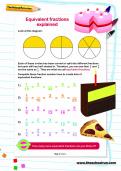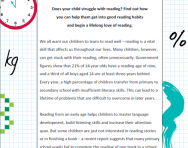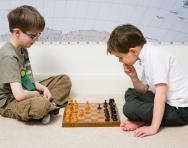What is growth mindset?

What does your child do when confronted with a tricky piece of homework? Do they see it as a challenge and work hard at it, trying different methods and learning from their mistakes – or are they more likely to huff and puff and then give up?
If your child falls into the former group, chances are they have what’s known as a ‘growth mindset’. They accept that things are not always easy, but are willing to have a go and persevere, rather than giving up if they stumble at the first hurdle.


Start a unique learning programme!
- Weekly programme for each school year
- Worksheets sent direct to your inbox
- Keeps your child's learning on track
In education terms, encouraging a growth mindset is a growing trend. ‘It’s very big in the US, and it’s hard to find a school that isn’t putting it into practice,’ says Dr Sherria Hoskins, head of the Department of Psychology at the University of Portsmouth and a member of the Growing Learners research group. ‘In the past 10 years, it’s been growing in popularity here and is becoming the zeitgeist.’
So what is growth mindset all about, and how can you encourage it in your child?
Growth mindset explained
A growth mindset is a person’s belief about the nature of intelligence. ‘It’s the belief that although we’re born with a certain level of intelligence, we can develop it throughout our lives through effort, strategies, facing challenges and learning from our mistakes,’ explains Dr Hoskins.
Conversely, if you have a fixed mindset, you believe that you’re born in a particular way and don’t have much scope for change. ‘If a person with a fixed mindset fails at something, they tell themselves that it’s just because of who they are and there’s not a lot they can do about it,’ says Dr Hoskins.
Why growth mindset matters
Recently, there’s been a lot of talk in the media and in education circles about the importance of building ‘resilient learners’ – and this, in essence, means teaching children to have a growth mindset.
‘Having a growth mindset means that when children face a challenge and fail, they tend to be more persistent,’ Dr Hoskins says. ‘They try another method, give it some attention or work harder. This in turn makes them better at whatever they’re doing – whether it’s reading, writing, maths or sport.’
Research by Growing Learners has shown promising results from teaching children growth mindset strategies. After six weeks of training, children’s grades in both literacy and numeracy had improved by two months more than would be expected in that time. A new study will soon be underway to test the theory further, training Year 5 and 6 teachers to deliver growth mindset lessons and activities to their pupils.
Children who have a fixed mindset, on the other hand, can fail to reach their potential. Because they don’t believe they can change, they have no strategies for coping when things get tough – you’ll often hear these children saying things like, ‘I’m rubbish at maths.’
‘Instead of persevering, they go into “self-protection” mode, where they try to hide the fact that they’re not doing well,’ Dr Hoskins explains. ‘This could be simply avoiding the thing that they find difficult – for example, by choosing the easiest homework task – or withdrawing their effort, or, at the extreme, cheating or truanting.’
Because these children are avoiding challenges and resisting putting in an effort, they deny themselves the opportunity to improve. ‘They go into a downward spiral of emotion where they get worse and worse at the subject because they’re avoiding it, which they then think proves the point that they’re no good at it,’ says Dr Hoskins.
How to give your child a growth mindset
It’s thought that most children naturally have a growth mindset, but their experiences at home or school can change this. ‘At around the age of four, children realise that people are making judgements about their ability, and start making self-judgements as a result,’ explains Dr Hoskins.
One of the most important things you can do to help your child develop a growth mindset is to think about the language you use around them. Using fixed language, like, ‘You’re so good at drawing,’ or, ‘Don’t worry – you’re just not very good at maths’ can lead to children developing a fixed mindset where they don’t believe they can change, grow and improve.
It’s better to focus your feedback – whether positive or negative – on the task itself, rather than your child’s ability. So, you could say things like, ‘I love the way you’ve drawn the sky in this picture – it’s so realistic’ or, ‘I think you could get this sum right if you had another go.’
‘Your voice then gives children strategies when they’re struggling, by telling them to try again, try harder or try another way,’ says Dr Hoskins.
Having high expectations for your child also helps them develop a growth mindset. ‘Children with a growth mindset who have high expectations and challenging tasks perform better, because low expectations create less growth in the brain,’ Dr Hoskins explains.
Bear in mind that high expectations are not the same as pressure. Saying things like, ‘I need you to get this homework right or I’m going to be really disappointed’ will put your child under pressure, which could in turn lead to self-doubt and failure. But turning it round and saying, ‘I know you can do this if you put some effort in’ gives them belief in their own ability and the confidence to try, fail and try again.
Alongside setting high expectations, teach your child how to cope with their emotions. ‘Society has taught children that when they’re working on something challenging and their heart is racing, to interpret it negatively,’ explains Dr Hoskins. ‘We can teach them to reframe this so that instead of thinking, “My heart is pounding, it must be because I’m so bad at this,” they think, ‘My heart is pounding, this is really hard but that means I’m learning lots.”’
We can also train children to celebrate their mistakes, rather than hiding them. ‘Some schools practising a growth mindset culture have a “learning mistakes board,” where the children sit around and share the “great mistakes” they’ve made that day and what they’ve learnt from them,’ says Dr Hoskins. ‘Helping children to face up to their mistakes will lead to them seeing them as part of the learning experience.’ So the next time you’re tempted to correct your child’s homework for them, hold back: you could be denying them a vital opportunity to learn, grow and improve.
Growing Learners has published the first in a series of storybooks about growth mindset, The Mystery of Mrs Raven.

Give your child a headstart
- FREE articles & expert information
- FREE resources & activities
- FREE homework help








